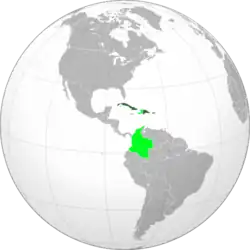Antillean Confederation
The Antillean Confederation was the vehement idea of Ramón Emeterio Betances about the need for natives of the Caribbean to unite into a regional entity that would seek to preserve the sovereignty and well-being of Cuba, the Dominican Republic, and Puerto Rico. Supporters of the idea wanted to free the Spanish colonies of Cuba and Puerto Rico, later uniting them with the Dominican Republic, creating a united Spanish Caribbean nation. Some proponents of the idea also supported the inclusion of Haiti and Colombia.
Antillean Confederation Confederación de las Antillas | |
|---|---|
 Flag | |
 Orthographic Projection of Antillean Confederation. Original proposed members in dark green and additional proposed members in light green. | |
| Largest city | Santo Domingo |
| Official languages | Spanish |
| Area | |
• Total | 167,429.78 km2 (64,645.00 sq mi) (89) |
| Today part of | Cuba, Dominican Republic, Puerto Rico |
The idea was supported by many of the generals who fought in wars such as the Dominican War of Independence, the Dominican Restoration War, the Ten Years' War, the Little War, the Cuban War of Independence, and the Grito de Lares uprising. Support was strongest from the 1850s up until the Spanish–American War, which transferred the colonies of Cuba and Puerto Rico from Spain to the United States, since then the support for the idea largely faded away.
Its main idea was to subsequently end European colonialism in the Americas as well as a response to the Monroe doctrine phrase America for the Americans, which Betances changed to Antilles for the Antilleans. The main gathering point of the idealists was San Felipe de Puerto Plata, Dominican Republic.
Strong supporters of this idea:
- Eugenio María de Hostos,[1] also known as The Citizen of the Americas
- Gregorio Luperón, hero of the Dominican Restoration War
- José Martí, often referred to as The Apostle of Cuban Independence
- José de Diego
- Ramón Emeterio Betances
- Anténor Firmin